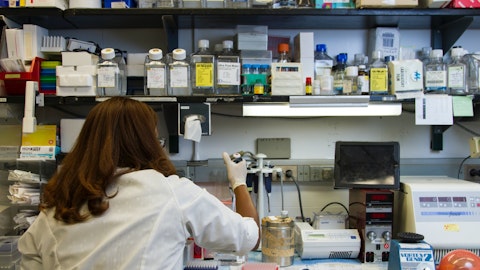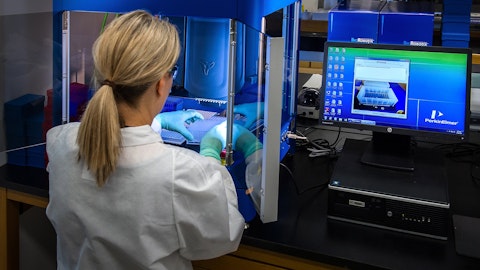Matt Larew: Hi, good morning. About data storage, so obviously you mentioned you’re moderating expenses there, but you also mentioned that you feel like you have a significant lead just curious why that level of reduction in spend with the right one that you contemplate perhaps more or pausing or maintaining investment just sort of given as a modest reduction. Just wanted to get a sense for what was contemplated and why it is settling on sort of that level of investment?
Emily Leproust: Yes, thank you, Matt. Very, very great question, I think we see a tremendous opportunity in data storage for long-term value creation. At the same time, we have a slot to deliver short-term value creation, so we have to make some way — sort of full capital allocation decisions. What we are seeing is that the market for data storage is – the more we sense it, the most certain we are about it. At the same time as I mentioned we are head and shoulders ahead of the competition and so we see our data storage investment as a lever that we have in managing the business. And so, as we are focusing on adjusted EBITDA breakeven for the core and biopharma business and ending getting there with as much cash in the bank as possible.
We’re able to lower our investment in data storage without losing our competitive edge. And so what that means is we’ll have to do less, so we do a bit less of market development. We’re not going to do the early access with the gigabyte chips. Instead, we will show the end-to-end demonstration, which is important that the systems it’s going to show that we can do data-in, data-out, but we don’t have to go commercial with that system. Instead, we’re going to focus on growing commercial with the next chip, the terabyte chip which is going to be disruptive, from a total cost of ownership point of view. And for that — that’s a significant change. The gigabyte chip was more for demonstration and so we’re not going to commercialize something that the demonstration extend we’re going to focus on commercializing a chip that is service-based, and a chip that is disruptive from the one where we can get revenue growth and really good margin from day one.
Matt Larew: Okay, understood. And then if we sort of look at your quarter result I think — those bear out that in SynBio and NGS you entered this market as disruptors and taking share, growing above market. It’s more challenging on the outside looking in to look at biopharma and assess how that has been going just given the number of acquisitions that you’ve made there? From that said looking in that market seems to be a bit more crowded and certainly evolving. What’s your assessment of kind of, you mentioned sort of the right assets. We also going through some internal changes. What’s your assessment for the offering you have their relative to your assessment of competition and how you think you’ve been growing perhaps either measured by win rate or pitches or revenue. What’s sort of the right metrics you’re looking at internally that gives you confidence that that asset is really a competitive and differentiated?
Emily Leproust: Yes, no that’s a very, very good question. And so from a technology point of view, our technology – our individual technology from the original Twist, we know that is very strong best-in-class technology. We have scientific data that the amounts that we got from at various is a slow head-to-head with all the amount is best-in-class as well. And so, the combination together, plus the addition of in silicon that we had it, our belief is that, that is the best set of tools comprehensive goal stand out as you can have for antibody discovery. So from a technology point of view, we’re extremely, confidence and from a commercial point of view, it’s a different story. In the change that we made, the decisive action as we did the sales team is untouched basically.




